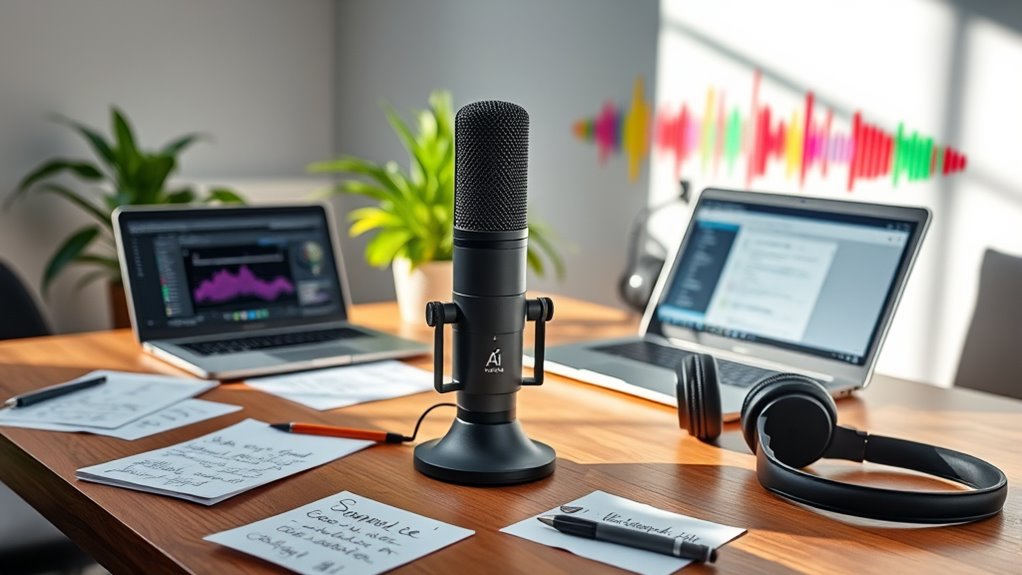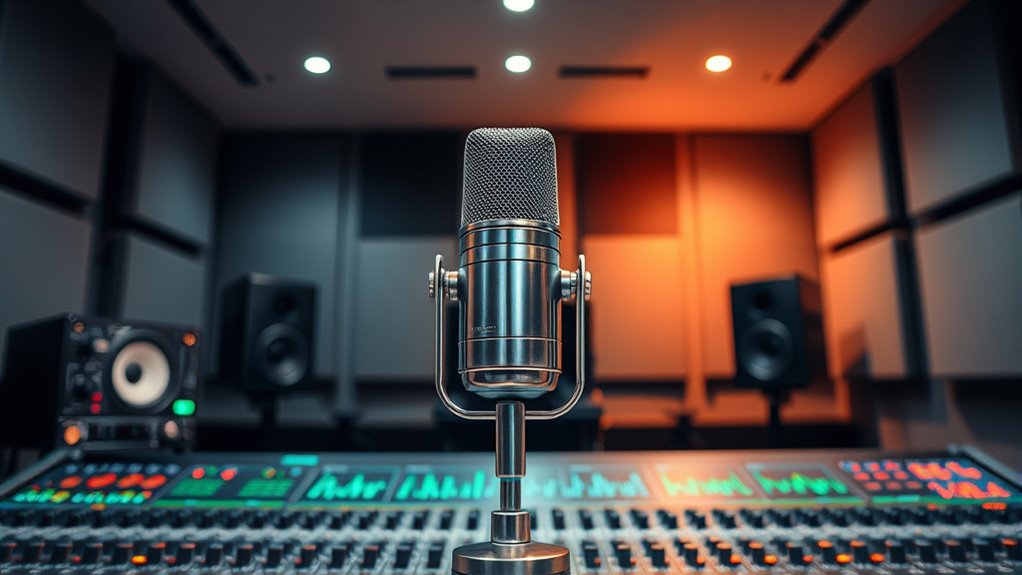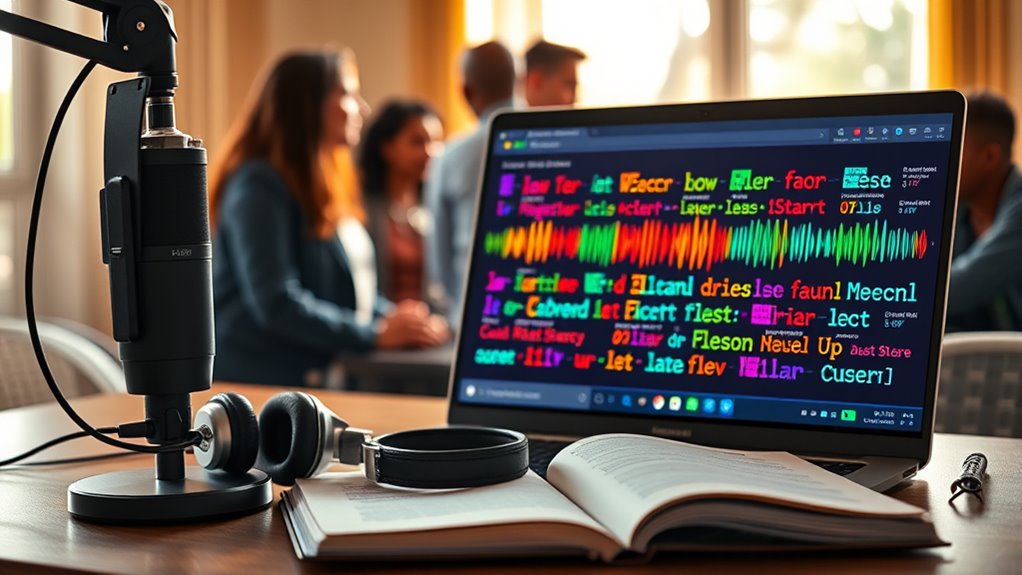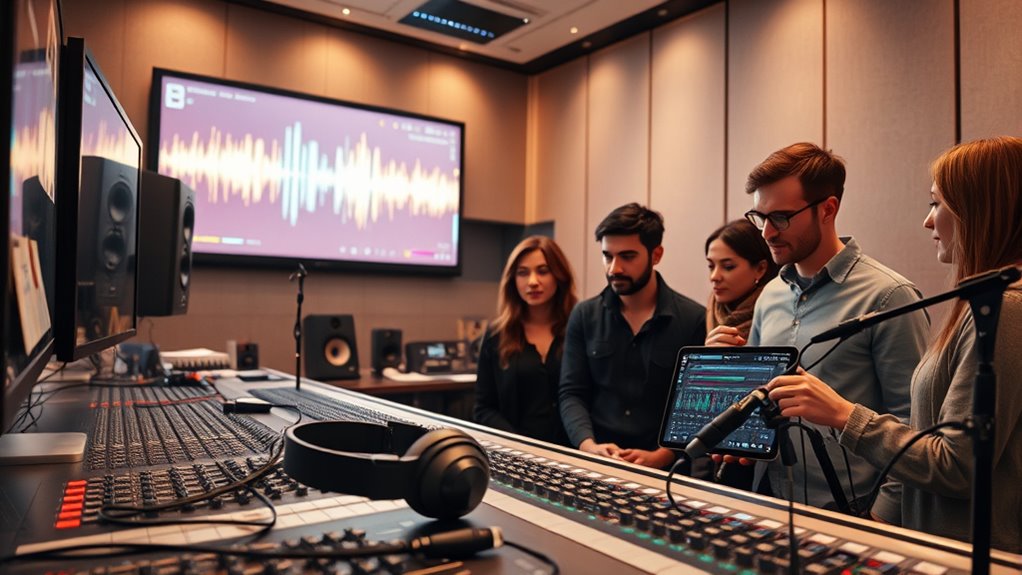AI transforms audio content creation by streamlining script generation and improving production efficiency. You can easily convert text into engaging audiobooks, customize voices to enhance audience connection, and automate tasks to save time. AI transcription and subtitles also make content more accessible, breaking down language barriers. As you explore further, you’ll uncover the exciting future of AI in audio production and the challenges it faces, ensuring you’re well-equipped for this evolving landscape.
Key Takeaways
- AI tools efficiently generate scripts, transforming ideas into structured audio content with advanced natural language processing capabilities.
- Text-to-audio conversion is enhanced by AI, allowing various formats to be narrated with immersive voice options and polished scripts.
- Voice customization features enable creators to choose from over 120 voice options, adjusting parameters like speed and pitch for unique audio experiences.
- AI significantly improves production efficiency, automating tasks and reducing time, making audio content creation more accessible for musicians and creators.
- Ethical considerations around copyright and data privacy highlight the need for clarity and fairness in AI-generated audio content.
The Role of AI in Script Generation

As you delve into the world of audio content creation, you’ll find that AI plays a crucial role in script generation. AI tools transform your ideas and outlines into structured audio scripts, speeding up your content creation process. Additionally, continuous advancements in algorithms enhance the efficiency and accuracy of these AI-driven tools. These tools also leverage data analytics for targeted advertising to ensure that your content reaches the right audience effectively.
AI tools revolutionize audio content creation by transforming ideas into structured scripts, significantly accelerating the production process.
You can apply these scripts for podcasts, audiobooks, or ads, ensuring they capture the right tone and flow. With user-friendly interfaces, even beginners can easily use these tools. This innovative approach mirrors the way intelligent tutoring systems adapt to individual learning needs in education. Moreover, natural language processing enables AI to generate scripts that resonate with listeners, enhancing engagement.
AI can create detailed episode structures, enrich your content with insights, and adapt to various formats. Plus, once you generate a script, you can edit and refine it to fit your vision.
This efficiency not only saves time but also enhances your storytelling capabilities, leading to more engaging audio experiences. Additionally, AI-driven storytelling techniques improve narrative depth, allowing creators to connect better with their audience.
Transforming Text Into Engaging Audiobooks

Transforming text into engaging audiobooks can elevate your storytelling and reach a wider audience.
Start by ensuring your script is polished and error-free before uploading it to AI platforms. You can upload various text formats like PDF, Word, or EPUB, allowing flexibility in the conversion process. Additionally, consider employing high-quality equipment to ensure the best sound recording during the narration process. The use of advanced technology can significantly enhance the overall quality of your audio production. Incorporating color accuracy in the visual elements of your audiobook cover can also attract more listeners.
AI tools enable you to segment the text into manageable sections, making it easier to navigate. Once your text is ready, you can paste it directly into the audiobook creation tool. This process saves time and helps you multitask.
With a diverse range of voices available, you can select one that best fits your story, ensuring an immersive listening experience. Embracing this technology can lead to improved engagement metrics and help you captivate listeners.
Embrace this technology to enhance your narrative and captivate listeners.
Customizing Voice for Enhanced Audience Connection

Customizing the voice in your audio content can significantly enhance your audience’s connection to the material. AI voice generators like Murf offer over 120 voice options in various languages and accents, allowing you to select a voice that resonates with your listeners.
You can adjust parameters such as speed, pitch, and emotional emphasis to create a tailored auditory experience. With voice cloning technology, platforms like TopMediai let you develop unique voices that reflect your brand’s personality. Additionally, combustion fans in wood pellet fireplaces enhance efficiency by promoting airflow, which parallels the importance of airflow in audio content for clarity and engagement.
Efficiency and Scalability in Audio Production

In an age where time is of the essence, AI is revolutionizing audio production by streamlining workflows and enhancing productivity.
With AI, you can generate a basic melody in under two seconds, making creation incredibly fast. It automates tasks like mastering and artwork generation, which cuts down production time and costs. This efficiency allows you to focus on creativity, experimenting with new sounds and styles.
As the AI music market grows, about 60% of musicians are already using AI tools, democratizing music creation for everyone. With projected revenue boosts of 17.2% in 2025, AI not only improves efficiency but also scales your ability to produce professional-sounding tracks at an unprecedented rate.
Enhancing Audio Quality With AI Tools

AI tools have revolutionized audio quality enhancement, making it easier than ever for creators to achieve professional-sounding results. Tools like Media.io and VEED.IO effectively reduce noise and improve speech clarity, ensuring your audio stands out.
With advanced AI technology, platforms such as Audioenhancer.ai and Meta’s Voicebox excel at removing background distractions, creating a polished sound. Google Cloud Text-to-Speech offers high-quality voice synthesis, allowing you to generate natural audio for various projects.
Thanks to deep learning and natural language processing, these tools provide intuitive options, making them accessible even if you lack editing skills. By utilizing these AI enhancements, you can elevate podcasts, music, videos, and audiobooks, ensuring an engaging experience for your audience.
Accessibility Improvements Through Transcription and Subtitles

While many creators strive to reach wider audiences, accessibility improvements through transcription and subtitles have become essential tools for achieving that goal.
AI transcription transforms audio into text quickly and accurately, often outperforming human transcribers, especially with various accents. This efficiency not only saves time but also cuts costs, making content creation more accessible for everyone.
Additionally, AI-generated subtitles break down language barriers, allowing you to connect with global audiences. You can customize subtitles for style and speed, enhancing the viewing experience.
The Future of AI in Audio Content Creation

As accessibility tools like transcription and subtitles pave the way for a more inclusive audio landscape, the future of audio content creation looks promising.
The AI voice generator market is booming, projected to grow from $3.6 billion in 2023 to $10.6 billion by 2032. With advances in deep learning and natural language processing, AI’s voice generation quality is skyrocketing.
You’ll see AI tools streamlining tasks in podcast production, enhancing audio quality, and enabling efficient dubbing and localization. Plus, integration with VR and AR will create immersive experiences.
As more companies adopt these technologies, expect new creative opportunities and personalized content tailored to your preferences. The evolution of audio AI is just beginning, and the possibilities are endless.
Navigating Challenges in AI-Driven Audio Production

Navigating the challenges of AI-driven audio production requires a keen understanding of both technical and ethical complexities.
You’ll face hurdles like data preparation, which demands high-quality input, and noise reduction that relies on sophisticated algorithms. When automating audio editing, ensuring accuracy across formats can be tricky. Real-time processing needs robust systems, while integrating AI tools into existing workflows often proves complex.
On the ethical front, copyright issues surrounding AI-generated content raise important questions about ownership.
Copyright challenges in AI-generated content prompt critical discussions on ownership and intellectual property.
You’ll also encounter debates on originality and job security for human artists. Ensuring fairness in AI systems and protecting data privacy are crucial.
Frequently Asked Questions
How Does AI Impact the Creative Process in Audio Production?
AI significantly impacts your creative process in audio production by providing fresh ideas and breaking through creative blocks. It generates unique melodies and patterns, allowing you to explore unexpected musical directions.
Can Ai-Generated Audio Content Replace Human Voice Actors?
While some might argue that AI-generated audio can never match the artistry of human voice actors, it’s essential to recognize that AI offers unique advantages.
It can produce consistent and cost-effective audio at scale, which is invaluable for certain projects. However, it can’t fully replace human talent, especially for nuanced performances requiring emotional depth and authenticity.
In many cases, a collaborative approach between AI and human actors will yield the best results.
What Are the Costs Associated With AI Audio Tools?
When considering the costs associated with AI audio tools, you’ll find several factors at play.
You’ll need to account for hardware expenses, as powerful GPUs can be pricey. Software licenses add to the costs, alongside the need for large datasets for training.
Hiring skilled developers and data scientists can significantly increase your budget. Lastly, subscription models can impact ongoing expenses, so it’s wise to explore different pricing plans before committing.
How Can I Ensure My Audio Content Remains Original With AI Assistance?
To ensure your audio content remains original, start by using specialized plagiarism detection tools to check for similarities.
Incorporate unique elements, like original sound effects, to enhance creativity.
Collaborate closely with AI, allowing it to assist rather than replace your creative input.
Regularly update your AI’s training data and maintain transparency about its use.
Finally, seek feedback to refine your content continuously, ensuring it resonates with your audience while staying distinct.
What Skills Do I Need to Effectively Use AI Audio Tools?
Did you know that 70% of audio professionals believe AI tools will transform their work?
To effectively use AI audio tools, you need a mix of technical and creative skills. Familiarize yourself with audio editing software, and ensure your computer meets the technical requirements.
Understanding sound design principles and music composition basics will enhance your creativity. Plus, being adaptable and open to learning will keep you ahead in this rapidly evolving field.
Conclusion
As you dive into the world of AI in audio content creation, you’ll discover a treasure trove of possibilities. From script generation to customized voices, AI can elevate your projects to new heights. Embracing these tools not only enhances efficiency but also connects you with your audience in meaningful ways. As you navigate this evolving landscape, remember: the future of audio is bright, and with AI by your side, the sky’s the limit!










